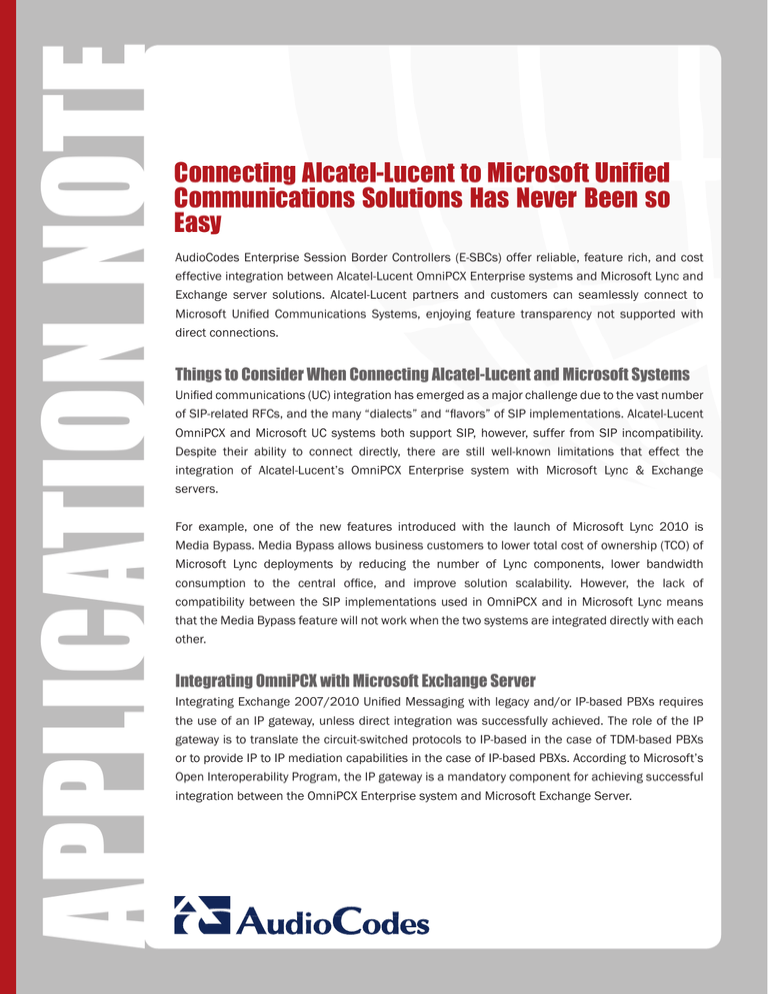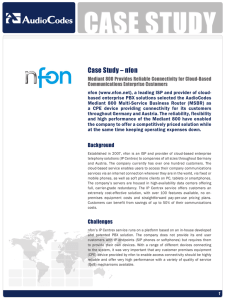
APPLICATION NOTE
Connecting Alcatel-Lucent to Microsoft Unified
Communications Solutions Has Never Been so
Easy
AudioCodes Enterprise Session Border Controllers (E-SBCs) offer reliable, feature rich, and cost
effective integration between Alcatel-Lucent OmniPCX Enterprise systems and Microsoft Lync and
Exchange server solutions. Alcatel-Lucent partners and customers can seamlessly connect to
Microsoft Unified Communications Systems, enjoying feature transparency not supported with
direct connections.
Things to Consider When Connecting Alcatel-Lucent and Microsoft Systems
Unified communications (UC) integration has emerged as a major challenge due to the vast number
of SIP-related RFCs, and the many “dialects” and “flavors” of SIP implementations. Alcatel-Lucent
OmniPCX and Microsoft UC systems both support SIP, however, suffer from SIP incompatibility.
Despite their ability to connect directly, there are still well-known limitations that effect the
integration of Alcatel-Lucent’s OmniPCX Enterprise system with Microsoft Lync & Exchange
servers.
For example, one of the new features introduced with the launch of Microsoft Lync 2010 is
Media Bypass. Media Bypass allows business customers to lower total cost of ownership (TCO) of
Microsoft Lync deployments by reducing the number of Lync components, lower bandwidth
consumption to the central office, and improve solution scalability. However, the lack of
compatibility between the SIP implementations used in OmniPCX and in Microsoft Lync means
that the Media Bypass feature will not work when the two systems are integrated directly with each
other.
Integrating OmniPCX with Microsoft Exchange Server
Integrating Exchange 2007/2010 Unified Messaging with legacy and/or IP-based PBXs requires
the use of an IP gateway, unless direct integration was successfully achieved. The role of the IP
gateway is to translate the circuit-switched protocols to IP-based in the case of TDM-based PBXs
or to provide IP to IP mediation capabilities in the case of IP-based PBXs. According to Microsoft’s
Open Interoperability Program, the IP gateway is a mandatory component for achieving successful
integration between the OmniPCX Enterprise system and Microsoft Exchange Server.
APPLICATION NOTE
OmniPCX Integration Limitations with Microsoft Lync
• All calls (Lync and OmniPCX) have to go through Front End / Mediation Servers, resulting in higher
latency and quality issues
• Call transfer scenarios are not supported between Lync and OmniPCX users
• Lync users cannot activate Call Hold in calls to OmniPCX and PSTN endpoints
• Ring-back tone is not supported when OmniPCX and PSTN endpoints call Lync users
• Comfort noise generation is not supported.
• Lync users cannot decline PSTN calls properly
• OmniPCX failover to an alternate route (in the case of network failover) does not work
Don’t Settle For Less – Choose AudioCodes Enterprise Session Border Controllers
AudioCodes Enterprise Session Border Controllers (E-SBCs) offer secured SIP-to-SIP interfaces for enabling
the integration of two dissimilar SIP-based systems. Using AudioCodes E-SBCs built-in SIP normalization,
header manipulation, and unique “Early Media” support, seamless and robust integration can be achieved
between Alcatel-Lucent OmniPCX on one side and Microsoft Lync and Exchange Server on the other.
All of this ultimately provides efficient integration leading to increased productivity and collaboration of
Alcatel-Lucent business customers. AudioCodes’ broad SIP integration with Microsoft Lync and Exchange
Server provides faster resolutions for the communication needs and integration challenges of Alcatel-Lucent
partners and customers.
Benefits
• Rapid integration in a cost-effective manner for the current and future communication needs and
integration challenges of Alcatel-Lucent partners
• Smooth and seamless connectivity between Microsoft Lync and Exchange Server and Alcatel-Lucent
OmniPCX Enterprise systems
• Enhanced security for a fully encrypted VoIP solution (SIPS/TLS, SRTP, IPSEC)
• Support for a fully redundant configuration
• Lowered total cost of ownership of Microsoft UC deployments
2
APPLICATION NOTE
About AudioCodes
AudioCodes Ltd. (NasdaqGS: AUDC) designs, develops and sells advanced Voice over IP (VoIP) and converged
VoIP and Data networking products and applications to Service Providers and Enterprises. AudioCodes is
a VoIP technology market leader focused on converged VoIP & data communications and its products are
deployed globally in Broadband, Mobile, Cable, and Enterprise networks. The company provides a range of
innovative, cost-effective products including Media Gateways, Multi-Service Business Gateways, Session
Border Controllers (SBC), Residential Gateways, IP Phones, Media Servers and Value Added Applications.
AudioCodes’ underlying technology, VoIPerfectHD™, relies on AudioCodes’ leadership in DSP, voice coding
and voice processing technologies. AudioCodes High Definition (HD) VoIP technologies and products provide
enhanced intelligibility and a better end user communication experience in Voice communications.
International Headquarters
1 Hayarden Street, Airport City
Lod 70151, Israel
Tel: +972-3-976-4000
Fax: +972-3-976-4040
AudioCodes Inc.
27 World’s Fair Drive,
Somerset, NJ 08873
Tel:+1-732-469-0880
Fax:+1-732-496-2298
Contact us: www.audiocodes.com/info
Website: www.audiocodes.com
©2011 AudioCodes Ltd. All rights reserved. AudioCodes, AC, AudioCoded,
Ardito, CTI2, CTI², CTI Squared, HD VoIP, HD VoIP Sounds Better, InTouch,
IPmedia, Mediant, MediaPack, NetCoder, Netrake, Nuera, Open Solutions
Network, OSN, Stretto, TrunkPack, VMAS, VoicePacketizer, VoIPerfect,
VoIPerfectHD, What’s Inside Matters, Your Gateway To VoIP and 3GX are
trademarks or registered trademarks of AudioCodes Limited. All other
products or trademarks are property of their respective owners. Product
specifications are subject to change without notice.
Ref. # LTRM-09065 06/11 V.1
3


